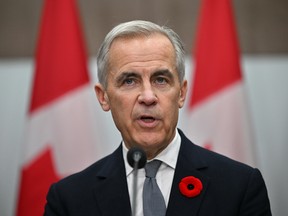
Article content
Prime Minister Mark Carney has promised the federal budget that will be tabled in the House of Commons this afternoon — a year and a half since the past one — will address persistent economic problems and a shattered trade relationship with the U.S. The Canadian economy is in poor shape and getting worse, with declining GDP/capita, weak GDP growth, almost seven per cent unemployment (double that for youth), out-of-control deficits, over $50 billion in annualized interest obligations, capital flight, stalled resource development and debilitating U.S. tariffs. Jason Jacques, Interim Parliamentary Budget Officer, has called our fiscal path “stupefying,” “shocking,” and “unsustainable.”
THIS CONTENT IS RESERVED FOR SUBSCRIBERS ONLY
Subscribe now to read the latest news in your city and across Canada.
- Exclusive articles from Barbara Shecter, Joe O'Connor, Gabriel Friedman, and others.
- Daily content from Financial Times, the world's leading global business publication.
- Unlimited online access to read articles from Financial Post, National Post and 15 news sites across Canada with one account.
- National Post ePaper, an electronic replica of the print edition to view on any device, share and comment on.
- Daily puzzles, including the New York Times Crossword.
SUBSCRIBE TO UNLOCK MORE ARTICLES
Subscribe now to read the latest news in your city and across Canada.
- Exclusive articles from Barbara Shecter, Joe O'Connor, Gabriel Friedman and others.
- Daily content from Financial Times, the world's leading global business publication.
- Unlimited online access to read articles from Financial Post, National Post and 15 news sites across Canada with one account.
- National Post ePaper, an electronic replica of the print edition to view on any device, share and comment on.
- Daily puzzles, including the New York Times Crossword.
REGISTER / SIGN IN TO UNLOCK MORE ARTICLES
Create an account or sign in to continue with your reading experience.
- Access articles from across Canada with one account.
- Share your thoughts and join the conversation in the comments.
- Enjoy additional articles per month.
- Get email updates from your favourite authors.
THIS ARTICLE IS FREE TO READ REGISTER TO UNLOCK.
Create an account or sign in to continue with your reading experience.
- Access articles from across Canada with one account
- Share your thoughts and join the conversation in the comments
- Enjoy additional articles per month
- Get email updates from your favourite authors
Sign In or Create an Account
or
Article content
Article content
Although negotiating with President Donald Trump can be challenging and unpredictable, other countries have concluded trade agreements with the Americans, including the EU, the U.K., Japan, South Korea, Indonesia, Malaysia, Thailand, Cambodia and Vietnam. These countries obviously believed the deals were the best they could negotiate to avoid higher tariffs. In contrast, Kevin Hassett, director of Trump’s National Economic Council, says “Canada has been difficult to negotiate with” and frustrations have built up over time. Last week, in response to an Ontario ad that went viral (which the PM knew about and did not oppose), the president said he would not talk to Carney for “a long time.” Elbows-up is producing own goals, with no deal in sight, so the budget has to deal with that overarching uncertainty.
Article content
Article content
By signing up you consent to receive the above newsletter from Postmedia Network Inc.
Article content
Although the domestic political advantage of Carney’s tough stance is fading, he clearly intends to exploit the trade crisis to provide cover for huge increases in public spending and government intrusion. He has effectively admitted that the budget will exploit failed negotiations to justify massive industrial policy, “unprecedented investment” and a “building spree” — all entailing “challenges” and “sacrifices.” Carney also plans to double non-U.S. exports over the next decade, which implies 50 to 60 per cent of our exports will be outside the U.S. Call me skeptical.
Article content
Article content
It is clear from his writing and speeches that Carney favours a dirigiste approach to the economy. When he said Canada was the most European of non-European countries he was really talking about himself and his own cultural and ideological leanings. The last thing Canada needs is European policies. They have resulted in weak economic growth resulting from sky-high energy prices, de-industrialization and unaffordable social programs. Carney’s besties Keir Starmer and Emmanuel Macron will go down in history as inconsequential leaders, rejected by their own people.
Article content
Article content
Whether Finance Minister François-Philippe Champagne actually deals with fundamental economic problems will depend, not on his turgid rhetoric, but on whether his budget takes concrete measures to constrain overall government involvement — including profligate spending — and vigorously supports the development of natural resources, in particular oil and gas pipelines. (Fully 72 per cent of Canadians say pipelines are key to Canada’s economic future). He also needs to tackle excessive regulations and red tape — including green net-zero red tape — and reduce our uncompetitive taxes (accelerated depreciation would be a welcome step). Furthermore, he should decisively reduce interprovincial trade barriers and halt the growth of the public service. And then there is the problem of excessive immigration, which is exacerbating the housing crisis and straining our health-care system.

.jpg) 20 hours ago
3
20 hours ago
3
 English (US)
English (US)